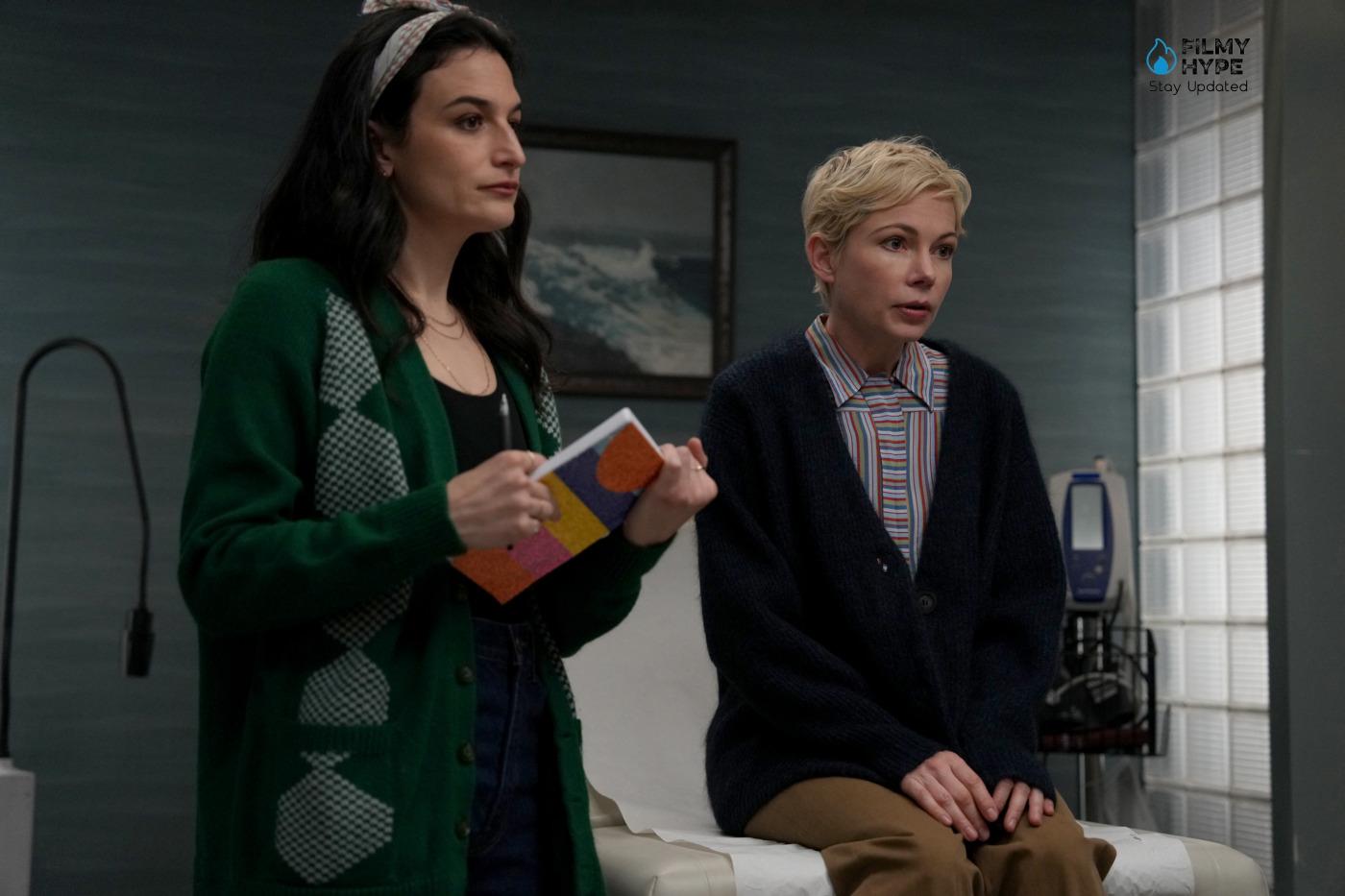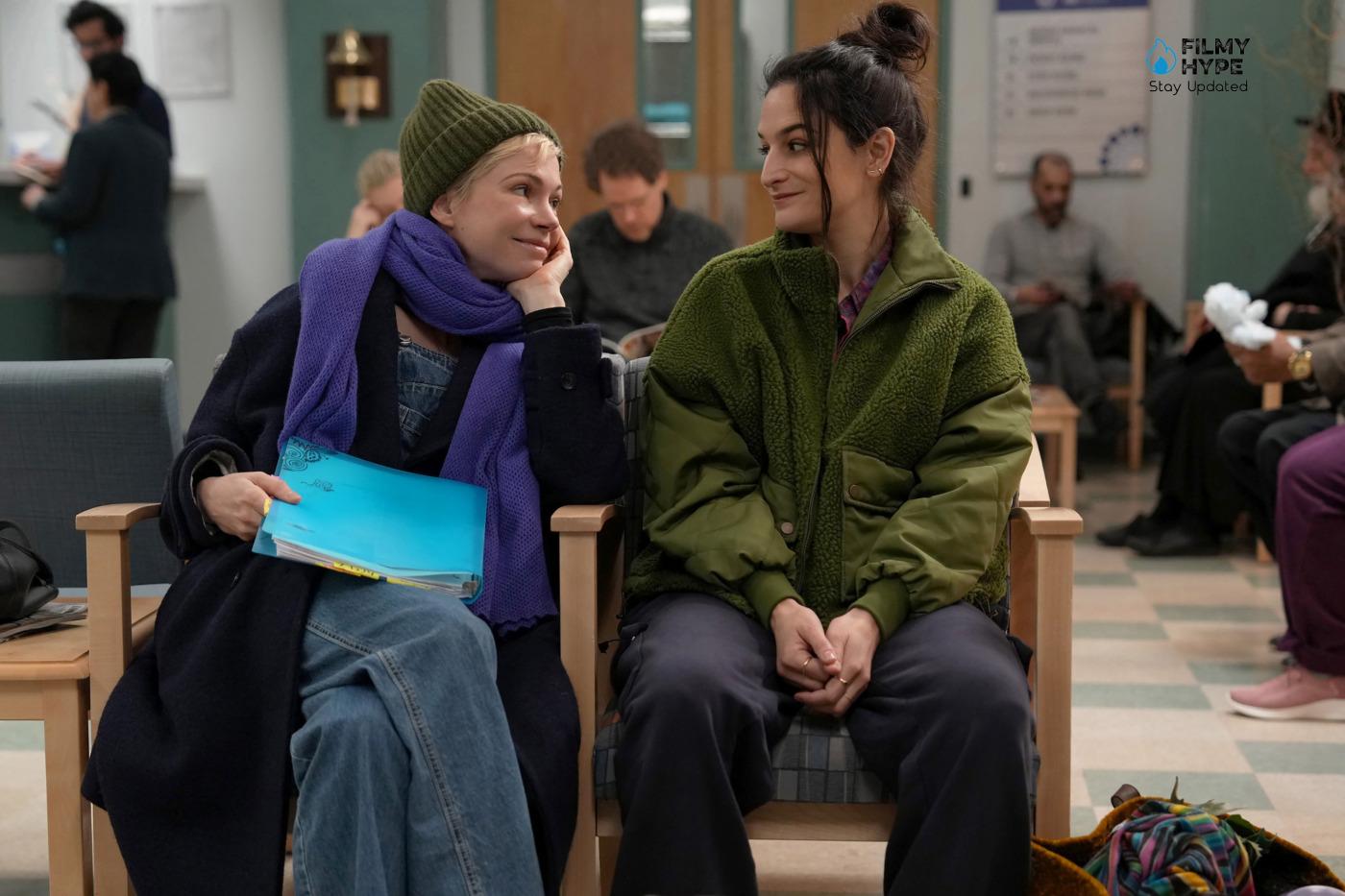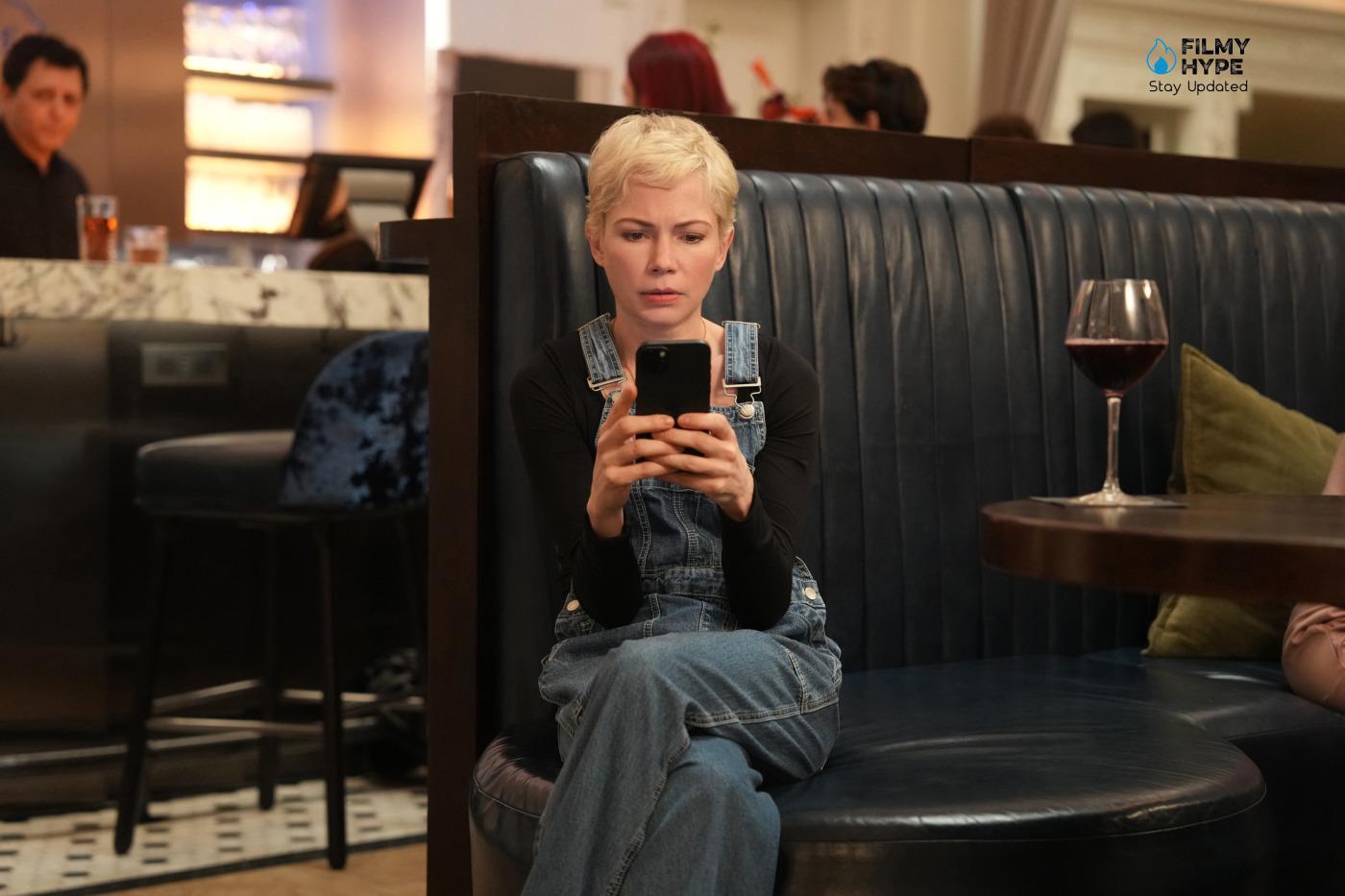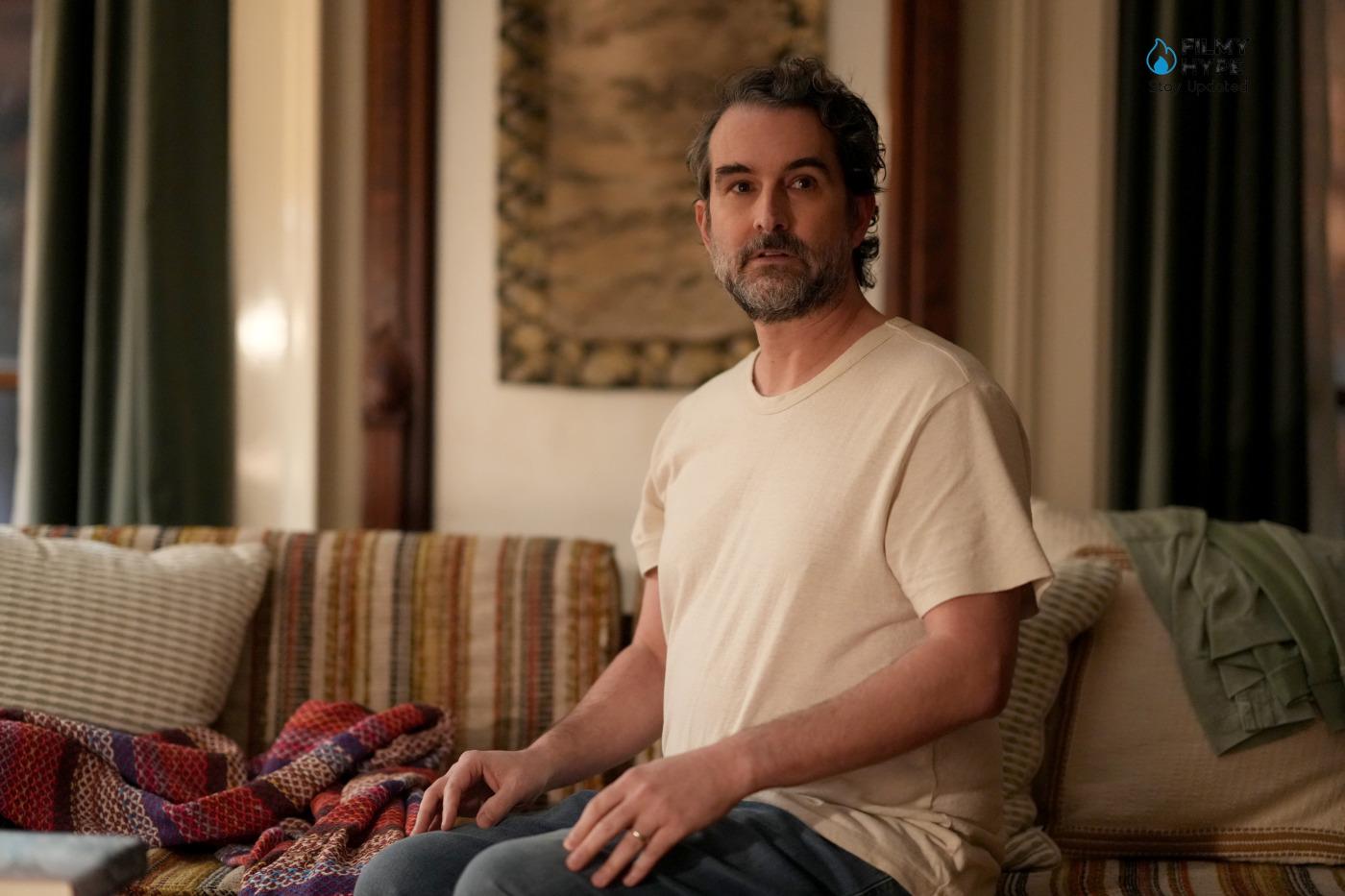Dying For Sex Series Review: The Importance of Being at Peace With Yourself?
Dying For Sex is the new FX series that, from April 4th, will be available in streaming on FX Network and Hulu with all eight episodes that sees the main protagonists Michelle Williams and Jenny Slate. It is written and co-created by Kim Rosenstock and Elizabeth Meriwether and is based on the homonymous podcast by Wondery and Nikki Boyer. There is a particularity behind all this. And no, we are not talking about it being based on a podcast because this type of broadcast has been very popular for quite some time so that even the Wikipedia page now exists, which collects all the various podcast adaptations made so far between cinema and TV series. And it has nothing to do even with the fact that the above podcast deals with real topics since, basically, it is common to many of them. If anything, it has to do with the specific topic told by the podcast first and then by the TV series (with the due licenses, as clearly stated by a disclaimer): the last weeks of a woman’s life with a fourth stage breast cancer that she decides, in the time she has left, to want to enjoy. Not in the broad sense of “enjoying life”, but in the more strictly sexual sense of the term.

Willingly or unwillingly, illness obliges us to confront the most intimate part of ourselves, to question ourselves with respect to the great mystery of life, to ask ourselves if the choices made so far have really been the right ones. Being able to seize an opportunity in the disease appears to the eyes of most like an oxymoron, but often it is precisely in the perspective of an imminent end – the greatest fear of every human being – that some of us are willing to dig deep, wondering who they have been up to that moment and if they can claim to know each other, although the process itself is not so automatic, but requires the presence of two components which in these cases – rightly – often tend to waver: mental lucidity and willpower. Some topics are often said to be taboo, however, American and/or English fiction is not afraid to face them, managing to find the right balance – between dark and humor – suitable for talking about certain topics.
Dying For Sex Series Review: The Story Plot
The plot follows Molly (played by a surprising one Michelle Williams), a woman who, after discovering that breast cancer has returned strongly, decides to leave her husband, Steve (Jay Duplass), and undertake a journey to discover his sexuality. Terminal diagnosis pushes her to fully live her desires, thanks to her best friend Nikki (Jenny Slate), the supports her in this search for pleasure and liberation. Despite the kick-off of the story being focused on sex, the series is also a powerful memory of the fragility of life and how it is essential to enjoy every moment, especially when the weather seems to be in short supply. In the beginning, Dying For Sex may seem more like a naked and raw comedy, with the protagonist freely exploring the world of sexual adventures. The series is bold in dealing with sex, with scenes that range from the most banal kiss to more unusual practices such as kink or role-playing. However, behind this exploration of pleasure, there is another story: that of a woman who has to do I you count with your body and with the physical scars of the present and the emotional ones of the past. Everything is told with great delicacy, despite the presence of explicit scenes and embarrassing situations.

In the center of the FX Network and Hulu series is Molly Kochan, who told her experience in a Wondery podcast, created together with her best friend Nikki Boyer. Their counterparts on the screen (Michelle Williams and Jenny Slate) gave birth to the story divided into eight half-hour episodes, based on the script by Kim Rosenstock & Elizabeth Meriwether (her own, the creator of New Girl, Single Parents is The Dropout). After learning that breast cancer – which she thought she had defeated two years earlier with a lot of mammoplasty – had come back to the fourth stage, young Molly decides to do quite the opposite of what others expect from her (remembering a little ‘ The Big C). So she leaves her husband Steve (Jay Duplass), all too comfortable in the role of loving caregiver rather than that of a passionate husband, and begins a journey together with her best friend Nikki, an aspiring disordered and messed up actress. The target? Explore your drives and sexual desires for the first time in your life, having always been satisfied.
Dying For Sex Series Review and Analysis
The first thing to think about when looking at Dying For Sex is that, perhaps, there is really something unfair that Michelle Williams, despite the five nominations received between lead actress and non-starring, has not yet won an Oscar. That she was an actress of great skill had already been understood at the time of Dawson’s Creek, even if perhaps, to have realized it immediately, it was we who at the time were teenagers or pre-teenagers and we were grappling with the vicissitudes of the high school students of Capeside. In Dying For Sex he embraces the difficulty of a performance that must be credible at the same time when he has to tell the story of a terminally ill patient and so daring to face scenes that involve masturbations, oral sex and a long series of kinks that we will not be here to list in order not to spoil the surprise. However experienced an actress may be, it is certainly not a trivial matter. Michelle Williams is sublime in ensuring that all this is experienced by the viewer with similar curiosity because it is a truly frank story from this point of view. That, respecting the memory of the real Molly Kochan, nothing is held back. Perhaps it is an exploration that would have been more incisive with a couple fewer episodes because a minimum of repetitiveness in the central episodes is felt, but it is still a very negligible defect.
It is also worth noting that despite a title that “sells” immediately the main topic, the Kim Rosenstock and Elizabeth Meriwether series says a lot about being at peace not themselves and not just about how Molly decides to spend the time she has left. Because Molly is not a monad who lives without having anyone around. And so those people who are close to her and who, as far as possible, accompany her on a journey of sexual awareness and serene acceptance of her being destined to die in a short time, also have the opportunity to deal with her own life. As if Molly was giving them a lesson that has nothing paternalistic but that is, if anything, an exhortation not to lose – out of laziness or who knows what other reason – the opportunities that life puts before you. And in the final episode, the one whose end is known from the very moment we push play on the first episode, Dying For Sex touches the highest point of his speech on a topic with which every person in this world has had, has and will have to do while pretending that this is not the case: death. It does so with narration, direction, and interpretations that manage to be light, deep, and incredibly straightforward. And it’s not that it’s a very simple thing to do.

Molly, in fact, is one woman who has lived for years in an intimate relationship, a bond that has broken under the weight of disease and routine. His sexual journey, therefore, as often happens in real life, is also a journey of self-knowledge. Its evolution collides with a painful past, marked by abuse in childhood, and with a complicated relationship with the mother, interpreted masterfully from Sissy Spacek. The series addresses these issues from an interesting point of view, avoiding the risk of falling into melodrama, especially thanks to the protagonist: independent, confident, decisive, and always ironic. One of the most fascinating aspects of Dying For Sex is the relationship between Molly and his neighbor, played by Rob Delaney. Initially a repelling figure, Delaney’s character develops surprisingly, revealing part of one of the most interesting dynamics of the series. The relationship between Molly and the close is at the same time playful and profound and explores power, control, and vulnerability, elements that seem to re-emerge in every relationship Molly undertakes.
What is missing from the protagonist of Dying For Sex is time and control: five years as a life expectancy. As the months pass, we see her go against everyone and even against herself. Overcome your conservation instincts to try and get involved because you won’t have any other opportunities to do it. The same goes for the best friend, who risks losing everything in order to be with her but is aware that those moments otherwise will never be returned to her. While trying to deal with the swing of mixed feelings typical of this type of diagnosis, Molly undertakes a real training novel, sentimental and sexual, to try to unlock and solve once and for all the traumas of one’s past. Being able to open up to the discovery of pleasure and try to take on the role of a self-confident woman, without considering herself alone as “sick”. There is great honesty and transparency in writing, in directing, in photography that exploits warm colors without being emphatic, in the wonderful and multifaceted interpretation that the cast provides, starting from an extraordinary Michelle Williams already in the smell of Emmy and with the “magnetic gaze” (to quote one of the characters).
Jenny Slate is the perfect counterpart on the scale, while the Duplass brothers are now subscribed to semi-toxic male roles, deliberately making fun of themselves. The recurring performers – like Rob Delaney – and the guest stars – cheer on the cake Sissy Spacek to stage the whole world that surrounds the protagonist and that does not always help her on her journey to (re) self-discovery. Kim Rosenstock & Elizabeth Meriwether manage to eliminate rhetoric from writing, to make characters say and perform actions that you would not expect, celebrating all that life offers (and takes away). It is like living the five stages of mourning before mourning itself, but without miracles or easy pathetisms; rather with the courage to speak with an open heart – with your doctor as with your affections – to ask for what you want. Without shame or modesty, but expressing our need for contact and human warmth, which in the end is what we crave most before leaving this strange Earth.

Talking a lot and with the right delicacy and irony of sex, Dying For Sex Yes also distinguishes for the intelligence with which it balances humor and pain. The series manages to navigate between lightness and gravity naturally, without ever falling into the vulgar or self-indulgent. The dynamics between the characters, unfortunately, at times are accelerated, as in the case of Nikki’s relationship with his partner Noah (Kelvin Yu), which is affected by one writing a little’ more superficial than the rest of the plot, but which however manages to find its decisive place. The cast, however, is impeccable. Michelle Williams gives life to a complex Molly, one woman who finds a way to regain possession of her life and of their desires. His performance is incredibly calibrated, avoiding the easy cliché trap of “woman repressed that discovers pleasure“. After all, it’s one true champion who has done nothing but grow constantly every time we see it on the small or on the big screen.
Instead, a pleasant surprise: Jenny Slate: Always known for her delicate and ironic notes, the actress shows a range here, awesome and emotional, moving from physical comedy to pure drama, without ever losing that acumen that characterizes its character, in front and behind the camera. Rob, too, manages to surprise with a performance that shows his extraordinary versatility. The rhythm of the series, with episodes of about 30 minutes, avoids the drop in tension that often afflicts contemporary television productions. The choice of keeping the episodes short helps to avoid the stalemate and makes Molly’s journey more pressing and engaging. Although some developments of the plot may seem rushed, the series manages to focus on the emotional growth of its characters without ever losing sight of its central premise: living fully, even when death is near. Dying For Sex starts from a bold premise and manages to deal with deep themes such as mortality, sexuality, and emotional self-sufficiency with great sensitivity. It is not just a story of sexual liberation, but one reflection on life itself, on the need to live intensely, to have experiences that enrich our existence, and not to let the pain of the disease cloud what makes us human. A brave, sincere, and, above all, terribly human.
Michelle Williams – who has been away from the screens for quite a while (the last time we saw her in The Fabelmans by Steven Spielberg, released in 2022) – is a great interpreter, charismatic and unpredictable, and is undoubtedly the beating heart of Dying For Sex. Her Molly is lively, witty, vulnerable: the actress returns with great intensity every emotional nuance of the character, passing with great ease from irony to despair, from sensuality to pain. A never caricatural performance, capable of showing all the truth and authenticity that the character carries with him: a woman who refuses to be defined by her diagnosis and who tries to regain possession of her body and emotions as she sees fit. But the script also manages to outline Molly’s relationship with the people around her: her best friend Nikki (Jenny Slate), the neighbor (Rob Delaney) and his mother Gail (Sissy Spacek) are characters that contribute to making Molly’s journey even more rich in nuances; a journey full of pain, of course, but also of laughter and desire to live, which does not end in the exploration of a free and brazen sexuality but which through it extends to undertake even more impervious paths, thus going to touch on particularly sensitive issues.

In the beginning, Dying For Sex appears as a courageous series because it dares to speak of female desire in a phase of life where, between illness, suffering, and death, that desire is often denied. Instead, Molly regains possession of her body and pleasure. There is nothing pathetic about his journey: there is only vitality combined with beauty, chaos, and humanity. What the story of Dying For Sex dwells on, however, is also the ability to live through disease and to be able to accept an often inevitable outcome. From this point of view, one could label Dying For Sex – among other things – as a delicate reflection on the importance of knowing and listening to our body, not only in the moment of its maximum splendor, when it can guide us to discover all the sensations that we deserve to experience, but also in the moment of its maximum decay, when it can teach us to welcome the unacceptable and to let us go, aware that we have finally fully lived the life we wanted; a life in which one should never be afraid of pain, desire or end.
Dying For Sex Series Review: The Last Words
Dying For Sex is an ironically honest and brutally sincere cross-section of cancer and sex, which are not two elements that are necessarily mutually exclusive. Michelle Williams, Jenny Slate, and the rest of the cast manage to return a story that smells of truth and dramatic transparency, skillfully mixing all the feelings that are felt in such a situation. As well as showing the tragicomic curtains in which the young woman who has been diagnosed with fourth stage cancer is found involved, without the possibility of going back. This courageous and engaging drama focuses precisely on the lack of time and control and the need for answers. In the final, Dying For Sex reaches (albeit by rebound) the most significant moment of his reflection on the theme of departure by means of a protagonist who invited the viewer all the time not to miss the opportunities of life. The show that explores sex, death and life courageously and provocatively, arouses emotion with the help of a score in terms of light and dark: with a directing work and the interpretations of the cast that manage to effectively blend naturalness, lightness and depth in the TV series, sometimes with some predictable and repeated scenes capable of satisfying the premises.
Stars: Michelle Williams, Jenny Slate, Rob Delaney
Creators: Elizabeth Meriwether, Kim Rosenstock
Streaming Platform: FX Networks and Hulu
Filmyhype.com Ratings: 3.5/5 (three and a half stars)







